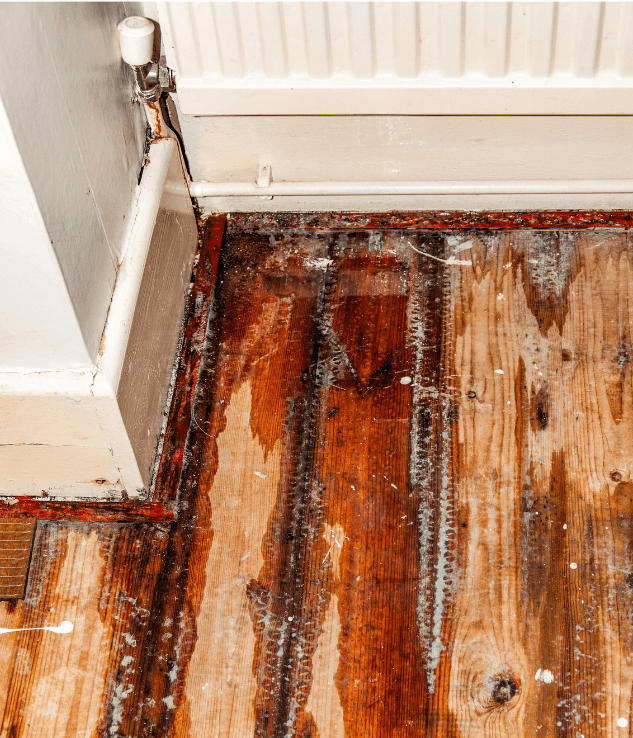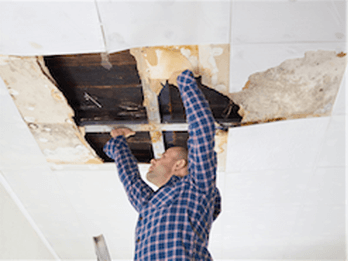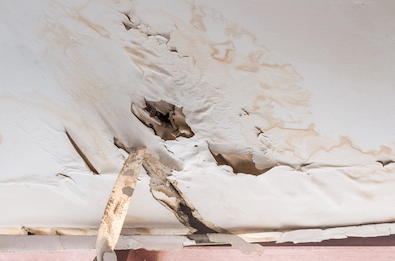Disclaimer: The information on this page is intended for general informational purposes only and is not to be used as a substitute for professional water damage restoration and legal advice. Colony Property Investments is a local New Hampshire home buying company that can purchase your water damaged house without you having to do anything.
Can I Sell My NH House With Water Damage?
In short, yes! Selling your house under normal circumstances is stressful enough, but selling with known water damage further complicates the matter. The price you may be able to sell your house for depends on the cause of the water damage, cleanup and remediation done, and extent of the damage. However, there are options to consider that affect how much you can sell your house for, and how quickly you can sell it.
Should you make repairs prior to selling your house? Can you sell your house with existing water damage on the open market through a real estate agent? Or, should you sell your house to an “as-is” cash house buyer? We’ll explore each of these options, and the advantages and disadvantages of each option..

Causes of Water Damage
As all homeowners know, home maintenance in itself is a never-ending challenge. Water damage can occur for many reasons, whether it be from the lack of maintenance, aging homes and/or malfunctioning appliances (e.g. water heaters, HVAC, heating systems, washing machines, etc.), weather related catastrophes or flooding. Other common causes include:
![]() Sewage backup
Sewage backup![]() Toilet overflows
Toilet overflows![]() Plumbing issues
Plumbing issues![]() Clogged gutters
Clogged gutters![]() Ice dams
Ice dams![]() Frozen pipes
Frozen pipes![]() Foundation cracks
Foundation cracks

Water damage costs can quickly become overwhelming. According to a recent study published by Insurance Business America, a report prepared by Verisk Analytics’ Insurance Services Office (ISO) found that, in 2017, the total amount of insurance payouts for water damage was $13 billion. The average claim cost about $10,000.
Even minor leaking if left unresolved over time can lead to not only cosmetic damage, but can cause extensive structural damage and damage to electrical wiring, gas lines, plumbing, and appliances. It can also have major health and safety implications. Moisture attracts termites and carpenter ants, which wreaks havoc on the structural integrity of your house. Mold growth occurs within 48 hours and rapidly spreads, causing more damage and can also cause serious health effects. It is therefore important to immediately address water damage cleanup as soon as leaks are detected.
Assuming the source of the water has at least been temporarily stopped to prevent additional damage, and the area has been dried to prevent mold growth, the first step in dealing with water damage to your house if you haven’t already done so is to immediately notify your insurance company. In the majority of cases, homeowners insurance will cover water damage as long as it isn’t due to neglect. If your house is in a flood area, flood insurance will be required for coverage of flooding incidents.
If water damage previously occurred and has not been repaired, you still have options.
Should I Repair Water Damage Prior To Selling My House In New Hampshire?
Water Damage Repair
Prior to attempting any water damage repair (especially “do-it-yourself” [“DIY”]), it is important to understand each type of water damage, impacts to health and safety, required remediation and restoration, and associated costs.
Water damage is categorized and classified by the Institute of Inspection, Cleaning and Restoration Certification (IICRC), which is the certifying body for the cleaning and restoration industry. Because of health and safety implications (and legal implications if selling your home through other than an “as-is” cash house buyer), it is highly recommended that a licensed professional assess water damage for proper cleanup and remediation.
In accordance with the IICRC S500 Standard and Reference Guide for Professional Water Damage Restoration, three “categories” define the source and cleanliness of water damage:
| Category 1: Clean water (water pipes, leaking faucets, rain, melted snow) | Repairs can be minimized if cleaned quickly. This category poses no health risks. However, if not immediately addressed, this damage can quickly downgrade to Category 2 or 3 within 48 hours or less. |
| Category 2: Grey water (water containing detergents, soaps, cleaning agents, urine from toilet overflow, or aquariums) | Higher cleaning and repair costs depending on damage severity (“Class” defined below). This category poses some health risks. However, if not immediately addressed, this damage can quickly become a Category 3 with serious health risks due to bacteria and mold growth. |
| Category 3: Black water (flooding from lakes, rivers, streams or contaminated groundwater, sewage backups) | Most costly cleaning and restoration, and often replacement of porous and absorbent building materials, carpeting, and household items. Homeowners can clean minor incidents such as a backed-up toilet, but more extensive incidents should always be done by certified mold and chemical remediation professionals. This category contains toxic contaminants that will cause serious health issues and possibly death. |
Water damage severity is defined by the following classifications:
Class 1: The least amount of water, absorption and evaporation. Surface water is limited to a small area and has not absorbed into building building materials with little to no absorption in carpeting and padding.
Class 2: Large amount of water, absorption and evaporation. Water affects entire room or more, and has saturated carpeting, padding, and building materials. Wicking of water in walls is less than 24 inches.
Class 3: The greatest amount of water, absorption and evaporation: Water affects entire room or more, and has saturated carpeting, padding, and building materials, including walls and ceiling. The source of water is usually from overhead (e.g. floor above, roof, piping in ceiling)
Class 4: Specialty drying situations where water has permeated into low permeance materials such as concrete, masonry, plaster, or hardwood. Saturation into these materails requires longer drying times or specialized drying methods
It’s not recommended that homeowners tackle water damage remediation and repair beyond Category 1, Class 2 unless damage is minimal, cleanup has been done immediately, and mold is not present. Otherwise, if you are considering selling through other than an “as-is” cash house buyer, we recommend consulting with a certified professional water damage remediation/restoration company.
Plumbing issues, ice dams, and frozen and/or burst pipes commonly cause damage that is beyond homeowner repair when moisture occurs within ceilings and walls, especially with mold growth. If damage is not immediately addressed or covered by insurance, out of pocket costs for professional repairs/restoration can range from replacing drywall and insulation to replacing flooring, drywall, insulation, rotted framing, roofing (ice dams), siding, wiring, plumbing, fixtures, and appliances. Basement water damage caused by foundation issues can also be costly depending on foundation repair and waterproofing solutions, particularly with finished basements.

Can I Sell My House With Water Damage Through A Realtor?
Selling your house with water damage through a real estate agent is possible depending on the extent of the damage. However, all damage and known problems must be disclosed to potential buyers. Prior to listing your house, we recommend getting repair estimates from certified professional water damage remediation/ restoration companies or qualified contractors. This will give you an idea of what to expect as a minimum price reduction.
There are additional challenges associated with selling your house with other than cosmetic or minor damage. Although many home buyers will not be interested in taking on major repairs, some buyers are in the market for “fixer-uppers”. But, it may take months to find the right buyer, and additional months to close. Structural damage, old and deteriorated plumbing systems, or foundation problems will make selling your house through a realtor much more difficult.
There’s No Need To Stress Any Longer…
Selling your house with water damage to an “as-is” cash home buyer avoids all the stress and hassles of mitigation and repair, and waiting months to sell your house. Minor damage or major damage…we’ll make you a fair offer, and without having to pay commissions, fees, or closing costs! Yes, you will still have to fully disclose all known problems. But, we never use that to justify a low-ball offer. We also close with cash at a local reputable title company, usually within 2 weeks or less. We can also close whenever it’s convenient for you.
Why stress any longer? Fill out the form or give us a call today at (603) 605-1261!
Get Your FREE No Obligation Offer Started TODAY!
We buy houses in any condition, no repairs, no cleaning. No realtors – No commissions or fees.. Find Out How Much We Offer For Your House !

